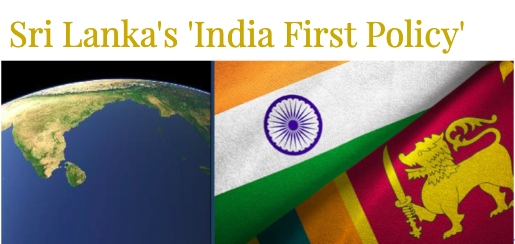
Due to the change in the order in the global power shift, countries have to balance its foreign policies in making based on its interdependencies with its neighbouring nations. Small nations like Sri Lanka have to adopt a balancing act concerning it’s existing United State’s Indo-Pacific Foreign Policy and India’s Neighbourhood First Policy. This has resulted in significant engagements along with subsequent arrangements with major countries such as India. Lately India’s regional interest with its southern neighbour, Sri Lanka has been pivotal. While framing their foreign policy the main aim should be to promote Sri Lanka’s national interest in synchrony with India without compromising its relations with other major nations. The “India First” approach is a key policy that Sri Lanka is adopting under the guidance of the new government. For Sri Lanka, the challenge has been maintaining stability and sovereignty in the face of external pressure where diplomacy has been the key tool in relationship building.
Sri Lanka’s India First Policy
With the new India First approach doctrine, Sri Lanka does not aim to jeopardise India’s ongoing strategic security interests in the India Ocean realm. The main aim of the policy is to create a shift in global order wherein Sri Lanka would not be anymore reliant on a West-oriented policy. As the closest neighbour, the new strategic security policy has an “India first” approach though Colombo remains open to dealing with other key players like the US and China for economic development. This new approach can influence trade, aid and maritime security that requires a new impetus in this era.
In the 21st century, the power matrix between bigger and smaller nations will be determined by this paradigm shift in the global order. The evolving geopolitical concerns in the South Asian region has prompted India to forge a deeper commitment with Sri Lanka. Historically, India has stood by the island nation during its time of need and today it still abides by this policy by being a reliable partner and by easing the island nation’s economic burden. The prime objective of India’s relations with Sri Lanka has been trade diplomacy and maritime security.
India’s Neighbourhood First Policy
India is emerging as a regional power that has expanded its maritime orbit of security in the Indian Ocean particularly with its southern neighbour Sri Lanka. Small islands like Sri Lanka have exerted influence on nations like India by appealing on their mutual interests. India is one of the largest nations in the South Asian region, sees Sri Lanka as of vital importance for its geopolitical and trade interest and in promoting its Neighbourhood First Policy and SAGAR doctrine.
From the power bound and trust-building neighbourhood strategy – the Gujral Doctrine of the late ’90s to the present day Neighbourhood First Policy, India -Sri Lanka relations have slowly developed as far as perceiving economic diplomacy as a priority. In 2014, one of the key local strategy needs was India’s Neighbourhood First Foreign Policy which had a significant bearing in setting the neighbourly connection among India and Sri Lanka.
On the economic front, India is Sri Lanka’s biggest trading partner regionally. Since 2000 when the Indo Sri Lanka Free Trade Agreement (ISFTA) came into implementation, Sri Lankan bilateral trade with its large neighbour has expanded generously, giving the island nation more extensive admittance to India’s 1.3 billion consumer market. India is among the best five contributors of Foreign Direct Investment (FDI) in Sri Lanka.
On the other hand, India’s foreign and defence policy with its southern neighbour is intact to create an environment of collective security and for enhancing the connectivity of the exclusive economic zone (EEZ). Therefore, Sri Lanka considers India as its most trusted and closest external partner which guarantees it with economic stability to balance the order in the global shift. Safeguarding the territorial integrity of these small island states like Sri Lanka is the prime importance of India under the SAGAR Doctrine and Neighbourhood First Policy.
New Found Optimism in the Neighbourly Interdependence
The nature and approach of dealing with small island nations have benefits as well as serious challenges in the long run. India and Sri Lanka share strong and consistent economic interdependence. In totality, economic diplomacy is certainly a very important part of this foreign interface. India’s constant support for Sri Lanka has proved its true genuineness and priority through India’s Neighbourhood First policy. However, for India safeguarding the territorial integrity in the South Asian region as well as in small island states like Sri Lanka should be of primary importance. India’s consistent help for Sri Lanka has demonstrated its actual validity and need through India’s Neighbourhood First policy. Therefore, Sri Lanka considers India as its most trusted and closest external partner which guarantees its security in the global front. India has noted the clear declaration of the India First Security policy by Sri Lanka by a newfound optimism.




